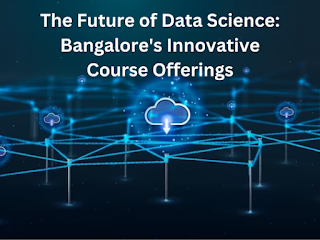comprehensive learning path – Data Science in Python
A comprehensive learning path for Data Science in Python typically follows a step-by-step progression from foundational concepts to advanced techniques. Below is a suggested learning path to help you get started:
Python Basics:
Get familiar with Python programming fundamentals, including variables, data types, loops, and functions. Online resources like Code cademy or w3schools offer Python tutorials for beginners.
NumPy and Pandas:
Learn NumPy for numerical operations and Pandas for data manipulation and analysis. Both libraries are essential for working with data in Python. You can find tutorials on the official documentation and online platforms like DataCamp.
Data Visualization:
Explore data visualization libraries like Matplotlib and Seaborn to create various plots and charts for data science course fee in Bangalore exploration. Practice visualizing data using different datasets.
Data Cleaning and Preprocessing:
Learn techniques to clean and preprocess raw data, handle missing values, and deal with outliers effectively.
Statistics and Probability:
Build a strong foundation in statistical concepts like mean, median, standard deviation, hypothesis testing, and probability distributions. Courses on Coursera or Khan Academy can be helpful.
Machine Learning Basics:
Understand the fundamentals of machine learning, including supervised and unsupervised learning, model evaluation metrics, and the bias-variance tradeoff.
Scikit-learn:
Dive into scikit-learn, a powerful library for machine learning in Python. Learn how to apply various algorithms for regression, classification, and clustering tasks.
Model Evaluation and Hyperparameter Tuning:
Learn techniques for model evaluation using cross-validation and grid search for hyperparameter tuning to optimize model performance.
Feature Engineering:
Explore feature engineering techniques to create relevant features and improve model accuracy.
Advanced Machine Learning Techniques:
Explore advanced machine learning algorithms like Random Forests, Gradient Boosting, Support Vector Machines, and deep learning using TensorFlow or Keras.
Natural Language Processing (NLP):
Learn NLP techniques for text processing, sentiment analysis, and topic modeling using libraries like NLTK and spaCy.
Time Series Analysis:
Understand time series data and explore techniques like ARIMA and Prophet for time series forecasting.
Big Data and Spark (Optional):
If interested in handling big data, learn how to use PySpark with Apache Spark for distributed data processing.
Data Science Projects:
Work on real-world data science projects to apply your skills and build a portfolio of completed projects.
Data Ethics and Privacy:
Understand the ethical considerations and privacy implications in data science.
Communication and Collaboration:
Practice presenting your findings in a clear and actionable manner, and collaborate effectively with stakeholders and team members.
For more information:
For more information:
360DigiTMG - Data Science, Data Scientist Course Training in Bangalore
Address: No 23, 2nd Floor, 9th Main Rd, 22nd Cross Rd, 7th Sector, HSR Layout,
Bangalore, Karnataka 560102
Email:enquiry@360digitmg.com
Phone no:1800 212 654321
Map: https://goo.gl/maps/4r8ayo9sjH6vPQYM7
Source link:http://instituteprograms.over-blog.com/2020/11/data-science-courses-in-bangalore.html
https://www.facebook.com/360Digitmg/
https://twitter.com/360digitmg
https://www.linkedin.com/company/360-digitmg
https://www.youtube.com/c/360DigiTMG

Comments
Post a Comment